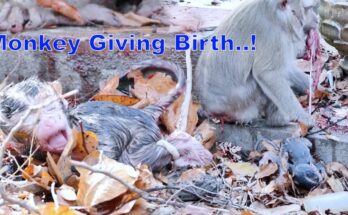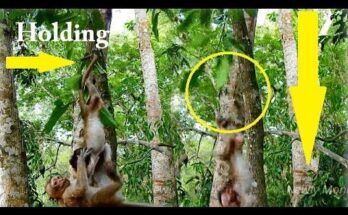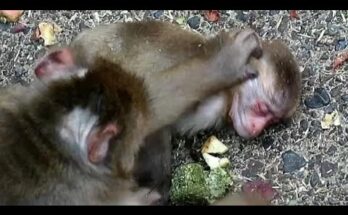In the quiet corner of a dense forest, a heartbreaking scene unfolds—a poor baby monkey lies motionless, weakened by an illness that has sapped all its strength. This fragile little creature, once lively and curious, now barely moves, its tiny body frail and trembling. The usual sparkle in its eyes has dimmed, replaced by a look of exhaustion and vulnerability that pulls at the heartstrings of anyone who witnesses its suffering.
The baby monkey’s chest rises and falls with shallow breaths, each inhale a struggle against the invisible weight of sickness pressing down on it. Its fur, once soft and glossy, appears dull and patchy, telling silent stories of days spent without nourishment or proper care. The tiny limbs that once climbed branches and clung tightly to its mother now lie still, almost lifeless. It no longer responds to the rustling of leaves or the gentle calls of its family nearby.
This young monkey’s condition is a stark reminder of how delicate life in the wild can be, especially for the most vulnerable. Illnesses in baby monkeys can arise from many causes—lack of proper nutrition, infections, parasites, or even the harsh effects of weather and predators. Without the warmth and protection of its mother or the troop, survival becomes a desperate challenge.
Nearby, the mother or caretaker might be searching frantically, calling softly in hope of a response. The bond between a mother monkey and her offspring is profound, often marked by tender moments of grooming, feeding, and protection. But in this moment, all that care seems to have been overshadowed by the baby’s illness. The helplessness of the situation weighs heavily on the heart of anyone observing.
Efforts to help such a fragile creature are difficult. In the wild, veterinary care is nonexistent, and nature takes its course without intervention. However, in sanctuaries or rescue centers, the baby monkey might receive fluids to prevent dehydration, medicine to fight infection, and gentle care to restore its strength. Every small sign of improvement—a flicker of movement, a weak grip on a finger, or a slight eye blink—brings hope and relief.
Watching the baby monkey lie still, we are reminded of the fragility of life and the importance of compassion. The image of this poor little being, so small and defenseless, calls for greater awareness and action to protect endangered wildlife and support rehabilitation efforts. It is a stark glimpse into the harsh realities faced by many animals in their natural habitat, struggling silently against sickness and hardship.
In this moment of stillness, the world seems to hold its breath, hoping for the baby monkey to find the strength to rise again. It is a powerful call for kindness and care, not just for this tiny life, but for all creatures who suffer unseen in the wild.


